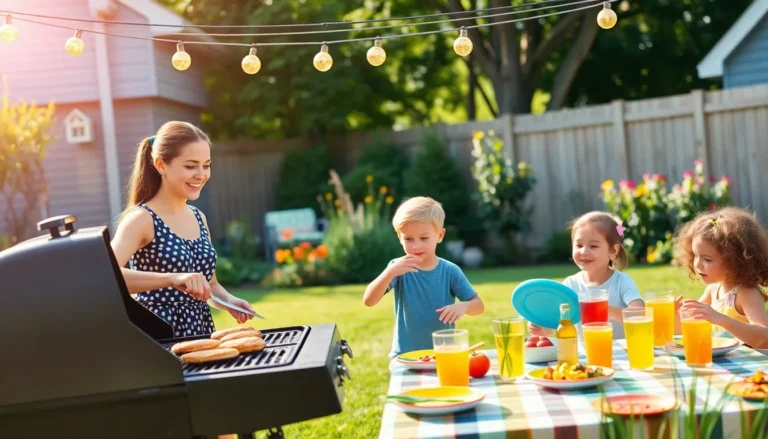Family traditions are the glue that holds us together, often serving as the backdrop for laughter, love, and the occasional eye-roll. From quirky holiday rituals to weekly game nights that turn competitive faster than a kid at a candy store, these customs shape our identities and create lasting memories. Who doesn’t have that one uncle who insists on telling the same embarrassing story at every gathering?
Table of Contents
ToggleUnderstanding Common Family Traditions
Family traditions represent shared practices that embody values and create lasting bonds among members. These routines often evolve over time, reflecting the unique identity of each family.
Definition of Family Traditions
Family traditions consist of rituals, customs, or habits that families practice together. Examples include specific holiday celebrations, regular family meals, or unique activities such as game nights. Each tradition serves to reinforce familial connections, ensuring that members recognize the importance of togetherness. Traditions vary widely across cultures and families, making them a rich tapestry of experiences and memories.
Importance of Family Traditions
Family traditions play a crucial role in fostering emotional and psychological well-being. They provide a sense of stability in a fast-paced world, anchoring members to their roots and history. Engaging in these practices strengthens relationships, enhances communication, and builds trust. Additionally, shared traditions often include storytelling, which helps transmit family values and life lessons across generations. Ultimately, these customs create a sense of belonging and help families navigate life’s challenges together.
Popular Common Family Traditions
Family traditions enhance unity and create lasting memories, reflecting a family’s identity. Various common practices can be observed across households, particularly in holiday celebrations, weekly gatherings, and special milestones.
Holiday Celebrations
Holiday celebrations often bring families together, fostering a spirit of togetherness. Families might decorate their homes with lights and ornaments, creating a festive atmosphere. Some traditions include specific meals served on holidays, like turkey for Thanksgiving or special desserts during Christmas. Unique rituals can emerge, such as wearing matching pajamas or reading favorite holiday stories. Families engage in gift exchanges, often incorporating personal touches to make the experience meaningful.
Weekly Gatherings
Weekly gatherings play a pivotal role in maintaining family connections. Many families set aside specific days for shared meals, allowing members to catch up and bond. These gatherings can take place over home-cooked dinners or casual barbecues in the backyard. Game nights or movie marathons may also enrich these meetings, encouraging laughter and conversation. Each gathering represents a committed effort to maintain relationships and foster communication among family members.
Special Milestones
Special milestones often serve as significant markers in a family’s history. Celebrations such as birthdays, anniversaries, and graduations create opportunities for families to come together. Traditions like throwing surprise parties or hosting family feasts add excitement to these occasions. Photographs and videos capture precious moments, preserving them for future generations. Each milestone reinforces family values and strengthens connections, illustrating the importance of celebrating achievements together.
Creating Your Own Family Traditions
Creating meaningful family traditions requires intentionality and creativity. By weaving in elements that resonate with family members, these customs can enhance connections and foster lasting memories.
Incorporating Cultural Elements
Cultural heritage enriches family traditions. Families can explore their backgrounds through food, music, and storytelling. Celebrating specific holidays allows members to connect with their roots, while incorporating traditional recipes promotes a sense of belonging. Sharing stories about ancestors helps transmit values and life lessons. Crafting rituals based on cultural practices encourages pride in heritage. Families can create unique customs that reflect their identities while cherishing the past.
Engaging Family Members
Involving all family members in tradition creation strengthens bonds. Gathering input from each person ensures everyone feels valued. Hosting brainstorming sessions for new ideas can spark creativity and excitement. Consider preferences and interests when planning activities. Regularly revisiting traditions helps families adapt to changing interests, making them more relevant. Documenting experiences through photos or journals allows families to reflect on growth and changes over time. Engaging everyone fosters a collaborative spirit and deepens family connections.
The Impact of Family Traditions on Relationships
Family traditions significantly influence relationships by fostering connections and creating lasting bonds. Through these customs, family members share experiences that strengthen their ties.
Strengthening Family Bonds
Shared traditions cultivate a sense of belonging among family members. Engaging in activities like holiday celebrations or weekly game nights invites participation and interaction. Families create cherished memories when they gather around the table for a special meal. Bonding activities, like creating holiday decorations or participating in sports, bring fun and laughter. As they engage in these practices, families reinforce their collective identity. Consistent rituals help members feel secure and valued, enhancing emotional stability.
Promoting Communication
Family traditions encourage open lines of communication. Regular gatherings provide a natural setting for meaningful conversations. When families partake in shared activities, they often discuss important topics in an informal atmosphere. This open dialogue fosters trust and understanding among members. It enables the transmission of family values and lessons through stories shared during traditions. As family members communicate more freely, they strengthen their emotional connections. Engaging with one another in these rituals highlights the importance of listening and supporting each other.
Family traditions serve as the heartbeat of a household. They create a tapestry of memories that bind individuals together and foster a sense of belonging. The laughter shared during game nights or the warmth of holiday gatherings illustrates the joy these customs bring.
As families navigate life’s ups and downs, these traditions provide a stable foundation. They encourage open communication and strengthen relationships, ensuring that values are passed down through generations. By embracing and evolving these practices, families can continue to celebrate their unique identities while nurturing deep connections. Ultimately, it’s the shared experiences that enrich family life and create lasting legacies.



